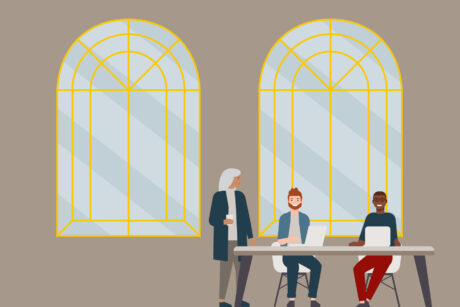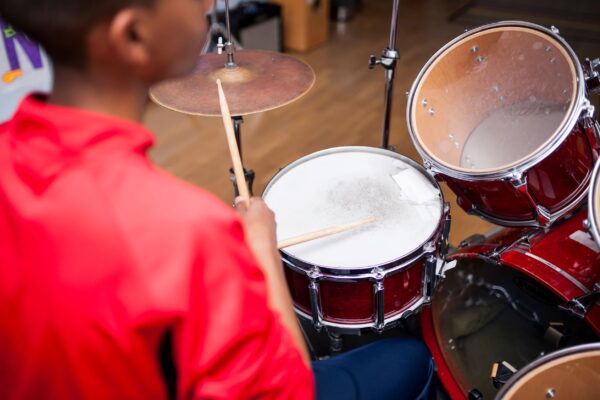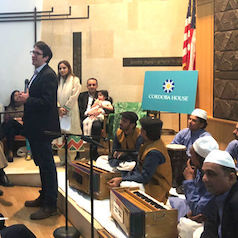A story about two Cooperative Baptist Fellowship congregations who offer examples of rethinking the profit there is in pavement.
Faithful Generosity Story Shelf
This story collection highlights congregations and other religious groups who are using their assets and resources in creative ways as an expression of faithful giving. Each story is short enough to read and discuss during a committee meeting or other group gathering. Use these accessible vignettes to spark new questions, conversation, and imagination with your leaders about funds, buildings, land, and other resources in your care. If you know a story that should be included in the Story Shelf, suggest it here.
Read stories about:

Investing for Impact
-
A Pastor’s Jericho in North Carolina
An enterprising pastor in Wilson, North Carolina pushed his congregation to revive its nonprofit and launch a plan to improve seven properties.
-
Building Black Wealth through Homeownership
Amid calls for reparations, Arlington Community Church launched a foundation to lend interest-free funds to help Black Americans purchase their first home in their community.
-
From Discernment to Epiphany
Atlanta’s First Presbyterian Church launched a social entrepreneurship program to recognize how God was already moving in their city and to provide business mentorship and financial assistance to aspiring social entrepreneurs.

Innovative Giving
-
Paying Reparations, Building Relationships
In an effort to make amends, the Episcopal Diocese of Maryland established a $1 million reparations fund to benefit Black communities.
-
Gift of Land Becomes $100k for Community
When a church member deeded a large plot of land to his church, the congregation leased 80 acres for solar farms, leading to a surplus of income and the Gratitude Project.
-
Church Grows a Solution to a Hidden Need
Bethel A.M.E Church of Ardmore responded to food insecurity in their community by starting a garden on their property. The project started with one bed and now has 15 that produced 1,200 pounds of food in 2022.

Selling/Donating Property
-
Church Finds Freedom in Selling Property
The congregation of Biltmore United Methodist Church sold their property and is devoting their energy and resources toward responding to Asheville, North Carolina’s most pressing social needs.
-
A Life Cycle and a Legacy
A rural Tennessee church closes with one final, old-time singing and a donation to a Christian disaster relief agency.
-
Presbytery Gives Property to Indigenous Group
Hudson River Presbytery transferred the title of former church to the Indigenous-led Sweetwater Cultural Center as a "pledge of partnership" and in an effort to make amends for harm done to Native American populations.

Sharing Property
-
Two-Stepping under the Sanctuary
When a church invites a line dancing group to use its basement for practice, a mutually beneficial relationship develops.
-
The Power of a Roof
A church and mosque collaborate to power—and empower—their neighborhood by installing solar panels on the church roof.
-
Preserving & Sharing Latino Culture
A church's fixer-upper parsonage becomes a community center to preserve Latino culture and bridge cultural, generational, and denominational gaps.
Browse more stories:
Kinder Academy boasts of “quality childcare that provides a structured preschool program with the convenience of daycare hours.” The childcare center at Bustleton UMC is the jewel in Kinder Care’s crown, made possible with the space and support offered by the congregation.

A story about a Cooperative Baptist Fellowship congregation who received a gift of land in Eastern North Carolina and discovering that it would be suitable for solar farms.
While the Church of the Advocate's ample campus and cavernous interior support Art Sanctuary’s practical needs for storage, rehearsal, and performance space, the church’s activist history is also a source of heady inspiration.

A story about a Cooperative Baptist Fellowship congregation using a preschool model that is not only self-sustaining but also provides some financial benefit to the church.
When a Muslim group needed a place for youth religious education, it began meeting at a synagogue. This arrangement led to mutual curiosity and real friendship.

A story about a Cooperative Baptist Fellowship congregation that is home to no less than five Birmingham-area nonprofit organizations and aside from the congregation’s weekly worship service, four other churches gather there on Sundays.
In 2004, the Muslim Center of Detroit partnered with physicians from the Islamic Association of Greater Detroit to open a free health clinic on the second floor of the prominent local mosque.

Bethel AME is helping to address the affordable housing crisis in San Diego by building affordable units on their property. They raised funds to offset construction costs enough to make the project self-sustaining.
Cass Community United Methodist Church plans to build a village of 25 tiny houses that the working poor or formerly homeless can rent to own.

